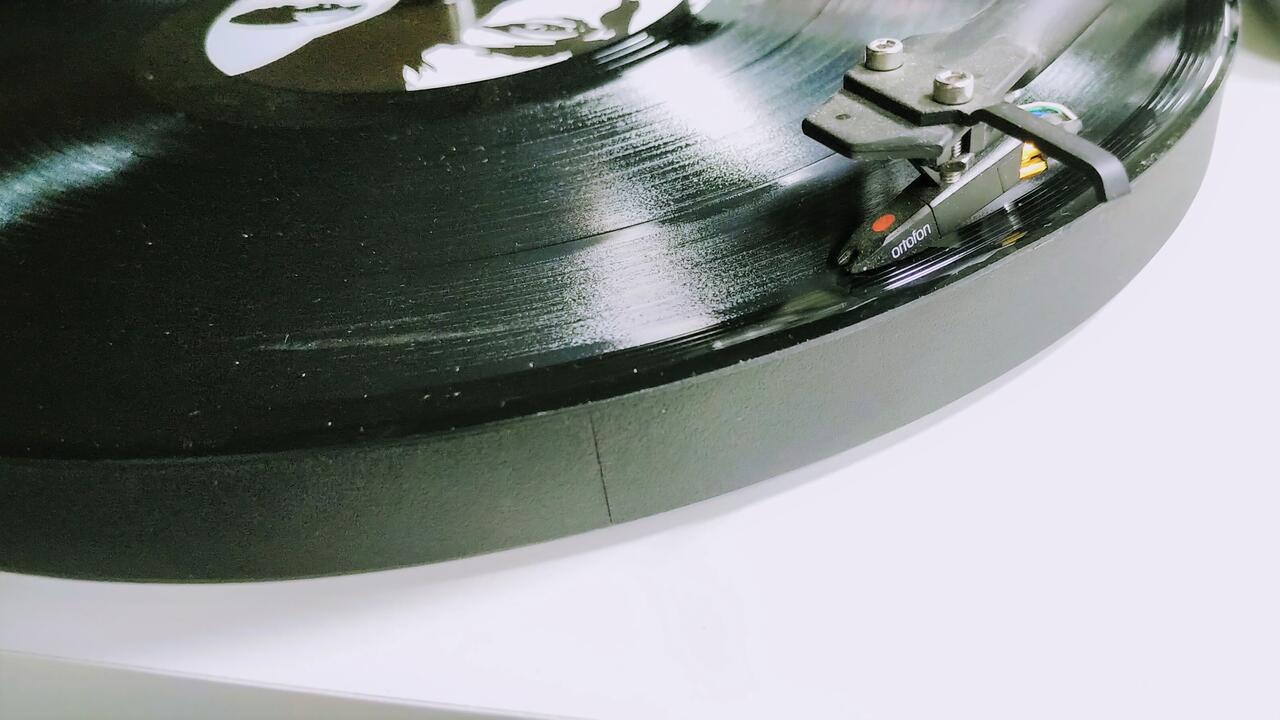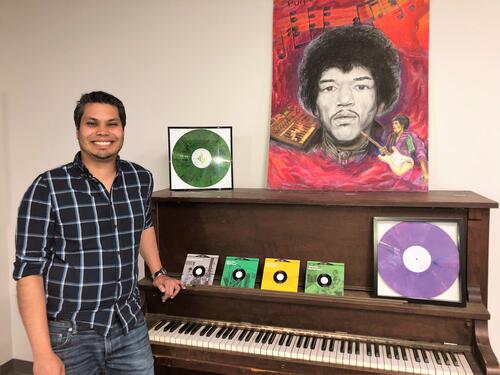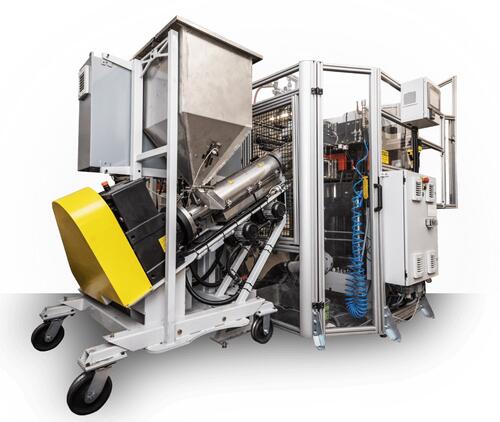
Fueling the vinyl revival
Alumnus co-founds company that makes modern, automated record presses

Alumnus co-founds company that makes modern, automated record presses
By Brian Caldwell Faculty of EngineeringThe idea of designing and building a modern new machine to produce old-school vinyl records came totally out of left field for James Hashmi.
Equipped with a 2007 degree in mechanical engineering from the University of Waterloo, he’d spent years establishing a career in medical technology, not traditional manufacturing.

James Hashmi poses with the office piano, one of his paintings and some of the records that have been pressed at Viryl Technologies in Toronto.
But when he looks back almost five years later, leaving medtech to help fuel the vinyl revival - now an estimated $1-billion annual industry – actually seems like a natural progression.
Hashmi, 36, was a visual artist and multi-instrument musician before pursuing mathematics, science and a career in engineering.
Now, as a co-founder and chief technology officer at Viryl Technologies in Toronto, all of those passions are in play together.
“Engineering gave me the tools and technical expertise to turn concepts into reality,” Hashmi says. “To bring everything full circle and tie it back into my artistic and musical roots has been a perfect marriage. It’s exactly what I wanted to do.”
Getting to this point just took a little serendipity.
While he was at Sentinelle Medical, a company developing breast and prostate cancer detection equipment using magnetic resonance imaging (MRI), Hashmi got to know co-worker Chad Brown and fellow engineer Rob Brown.
When the company was sold in 2014, the three friends started talking about going into business for themselves rather than moving with their new parent company to the United States.
Only then did Hashmi learn that Chad Brown was a former disc jockey who had owned the last vinyl record pressing plant in Canada before it closed in 2007.
That plant, Acme Pressing in Markham, operated with aging equipment manufactured in the 1960s and 1970s because nobody was making new presses for the fading record industry anymore.
By the time Hashmi and his would-be partners began kicking around business ideas, however, vinyl was enjoying a nostalgic comeback and Chad Brown had started hearing from old contacts in the business.
“The pressing plants that still existed, the ones that made it through everything and didn’t close down, were starting to run out of capacity,” Hashmi recalls. “They couldn’t keep up and record pressing machines were few and far between world-wide.”
With encouragement from an enthusiastic backer, the trio sized up the opportunity and took the plunge in 2015 to help meet the resurgent demand for vinyl records by making brand new presses to produce them.
Within a year, after bringing former Sentinelle colleague and Waterloo Engineering alumnus Michael Wybenga (BASc ’04, mechanical, MASc ’07, systems design) on board as well, they had a working prototype of the WarmTone - a fully automated press that borrows the best of old record pressing machines while incorporating modern sensors and computer software.

Viryl’s flagship record press, the WarmTone, is in operation around the world.
“We measure multiple data points with every record that comes off the press, so we have the capability to really dial things in and squeeze out that extra bit of quality,” says Hashmi. “We haven’t changed the essence of the vinyl, but we monitor it that much better to make sure it’s consistent.”
More than 50 of the 10,000-pound presses made by Viryl are now in operation around the world, including Japan, Taiwan, South Korea and Australia. Musician and producer Jack White is a client, as is the estate of the late Bob Marley in Jamaica.
Each press turns out two to three records a minute by squishing pucks of molten vinyl – or polyvinyl chloride (PVC) - between two rapidly heated moulds, which are fitted with stampers that imprint grooves for the particular album or single being produced.
The moulds are then cooled to set the grooves and the new records are trimmed to remove excess material around their edges.
Worked up from expired patents that had entered the public domain, as well as by talking to former operators and watching old videos, the design features easy setup to enable small, custom production runs, including the use of coloured and splattered vinyl.
Viryl, one of only two record press manufacturers in the world, employs about 25 people. In addition to making and selling machines, the company provides technical support and equipment maintenance, and presses records at its own plant for customers including DJ Jazzy Jeff.
“There is still something about holding liner notes and looking at artwork for an album,” Hashmi says. “The music industry is fickle, but the dedication to vinyl seems like a strong revenue stream. The demand is there and vinyl sales continue to grow.”
Still amazed at how circumstances came together to make it happen, he is also proud to have maintained ties to Waterloo by hiring co-op students and, most recently, collaborating on a master’s project involving the audio quality of vinyl.
“As a founder of an innovative business, that is key for me,” Hashmi says. “We’re always looking for ways to pay it forward to students and to the school.”

Read more
Velocity’s partnership with local hospitals and organizations helps streamline the ideation process for students invested in creating the next big health-tech solution

Read more
City of Kitchener partners with United College's GreenHouse to drive youth-led climate action with $64,000 in microgrants from Bloomberg Philanthropies

Read more
Waterloo alum and local entrepreneur advocates for a renewed culture of entrepreneurship to help fuel Canada’s future
The University of Waterloo acknowledges that much of our work takes place on the traditional territory of the Neutral, Anishinaabeg, and Haudenosaunee peoples. Our main campus is situated on the Haldimand Tract, the land granted to the Six Nations that includes six miles on each side of the Grand River. Our active work toward reconciliation takes place across our campuses through research, learning, teaching, and community building, and is co-ordinated within the Office of Indigenous Relations.
Select 'Accept all' to agree and continue. You consent to our cookies if you continue to use this website.